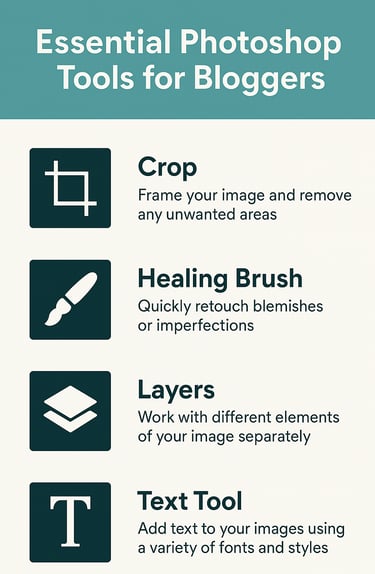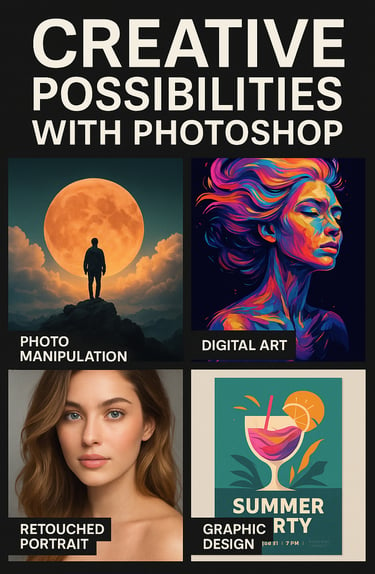The Ultimate Guide to Using a Photo Editor: Why Adobe Photoshop Still Reigns Supreme
This in-depth blog explores the world of photo editing through the lens of Adobe Photoshop, widely regarded as the most powerful tool in the industry. From beginner-friendly tips to expert-level features and creative workflows, it walks you through everything you need to know. Whether you're enhancing selfies, designing social media content, or retouching professional photos, this guide will help you unlock the full potential of Photoshop while comparing it to other popular editors and looking ahead to the future of editing powered by AI.
ADOBE
ALFATECK ADMIN
4/28/20254 min read


Introduction to Photo Editing
What is a Photo Editor?
A photo editor is any software that allows you to enhance, adjust, or completely transform images. Whether you want to fix red-eye, crop a photo, remove a pimple, or blend multiple photos into a surreal masterpiece — a photo editor is your best friend.
Why Photo Editing is More Relevant Than Ever
In a world where visuals dominate, the clarity and quality of an image can instantly shape how others perceive you. From influencers to business owners, everyone needs standout visuals. That's where tools like Adobe Photoshop come into play.
Adobe Photoshop: The Gold Standard
Brief History of Photoshop
Photoshop was originally developed in 1987 and made its official debut under Adobe in 1990. Since then, it's evolved into the most recognized photo editor on the planet, powering industries from photography to fashion and marketing.
Why Professionals Swear by Photoshop
Ask any professional photographer, designer, or content creator — Photoshop is in their toolkit. Why? Because it does what others can’t.
Versatility and Features
Need to edit RAW images? Create detailed graphics? Design a logo or retouch a portrait? Photoshop does it all.
Compatibility and Updates
Photoshop works flawlessly alongside other Adobe tools like Lightroom, Illustrator, and Premiere Pro — and with regular updates, it stays ahead of the curve.
Core Features of Adobe Photoshop
Layer-Based Editing
Layers let you edit specific parts of your image without affecting others. It’s like working on a transparent sheet — change what you want, without the risk.
Selection Tools and Masks
From the Lasso tool to Quick Selection, Photoshop lets you pinpoint and manipulate parts of your image like a pro. Masks allow non-destructive editing, preserving your original work.
Retouching Tools
Remove blemishes, wrinkles, stray hairs, or entire objects with tools like the Healing Brush, Clone Stamp, and Content-Aware Fill.
Smart Objects and Filters
Turn your layers into Smart Objects to apply filters that don’t alter the original content, giving you full editing flexibility. From blurs to sharpening, your edits remain reversible and refined.
AI-Powered Editing Features
With Adobe Sensei AI, Photoshop now has auto-subject selection, neural filters, sky replacement,
and more. It’s like having a mini editing assistant at your service.
Photo Editing for Beginners
Getting Started with Photoshop
The interface might look intimidating, but it’s surprisingly intuitive once you get going. Start with basic tools: crop, brightness, contrast, and layer management.
Best Tutorials and Resources
Platforms like YouTube, Skillshare, and Adobe's own tutorial library offer easy-to-follow guides for every level.
Tips for First-Time Users
Don’t try to learn everything at once. Focus on one feature per day, practice, and gradually build up. It’s a good practice to save your files in PSD format to keep all your layers intact for future editing
Photo Editing for Professionals
Workflow Optimization in Photoshop
Learn to use actions, scripts, and shortcuts. These tools help eliminate repetitive work and greatly enhance the efficiency of your editing workflow.
Batch Processing and Automation
Have 200 wedding photos to retouch? With built-in actions, Photoshop makes it easy to process multiple images at once, saving you loads of time.
Photoshop Plugins that Enhance Productivity
Try plugins like Nik Collection for filters, or Portraiture for skin retouching. They seamlessly integrate into Photoshop’s UI.
Comparing Photoshop with Other Photo Editors
Photoshop vs Lightroom
Lightroom is great for bulk color correction and organizing photos, but it lacks advanced manipulation features. Photoshop fills that gap.
Photoshop vs Canva
Canva is perfect for drag-and-drop design, but it’s no match for Photoshop’s pixel-level precision and advanced editing capabilities.
Photoshop vs GIMP
GIMP is a free alternative, but lacks the polish, features, and speed of Photoshop GIMP is a no-cost substitute, but it falls short in terms of refinement, functionality, and performance when compared to Photoshop. For anyone truly dedicated to professional-grade editing, investing in Photoshop is a smart and rewarding choice
How to Choose the Right Photo Editor
Use Case Based Decision Making
Are you an Instagrammer, a professional photographer, or just someone looking to touch up selfies? Your needs define your tool.
Budget and Features to Consider
If money’s tight, you might start with free tools. But if you’re aiming for long-term quality and control, Photoshop’s subscription model pays off in value.
Photoshop for Social Media Creators
Creating Instagram-Worthy Edits
Photoshop gives you the power to craft custom presets, adjust lighting, and completely revamp backgrounds to make your visuals stand out.
YouTube Thumbnails and Branding
Design eye-catching thumbnails with layer styles, stroke effects, and text overlays — all within Photoshop.
Advanced Techniques in Photoshop
High-End Retouching
Achieve magazine-quality skin smoothing, dodge & burn techniques, and liquify adjustments that preserve realism.
Surreal Photo Manipulations
Want to blend a fish with a forest? Photoshop’s blend modes, masks, and brushes make it possible.
HDR and Color Grading
Create dynamic, moody tones with selective color, curves, and gradient maps — turning flat photos into masterpieces.
Common Mistakes to Avoid in Photo Editing
Over-editing (yes, that porcelain skin look!)
Not using layers
Working destructively without backups
Ignoring color calibration
Future of Photo Editing with Adobe Photoshop
The Role of AI and Machine Learning
Expect smarter selections, instant edits, and predictive corrections — Adobe Sensei is only getting better.
Cloud-Based Editing and Collaboration
With Creative Cloud, you can edit on the go, sync files across devices, and even collaborate with teammates in real time.
Conclusion
In the vast world of photo editing, Adobe Photoshop isn’t just a tool — it’s the industry standard. Whether you're an amateur exploring filters or a professional chasing pixel-perfect precision, Photoshop has something for everyone. With its powerful features, regular updates, and incredible versatility, it remains the undisputed king of photo editors. If you’re serious about your visuals, there’s no better companion than Adobe Photoshop.
FAQs
Q1: Is Adobe Photoshop beginner-friendly?
Yes, with a bit of practice and some tutorials, beginners can learn the basics quickly and grow over time.
Q2: Can I use Photoshop on my phone or tablet?
Absolutely! Adobe offers Photoshop Express and Photoshop for iPad with many of the desktop features.
Q3: Is there a free version of Photoshop?
Not exactly, but Adobe offers a free 7-day trial of Photoshop’s full version.
Q4: How is Photoshop different from Lightroom?
Photoshop focuses on detailed, creative edits while Lightroom is best for quick, batch photo adjustments.
Q5: What’s the best way to learn Photoshop fast?
Start with Adobe’s official tutorials or follow YouTube creators who teach using real-world projects.








Alfateck Solutions
Empowering design and manufacturing with advanced software.
Contact Us
Email : sales@alfateck.in
Contact : 012421542249 +91-8384004022
© 2025. All rights reserved.
